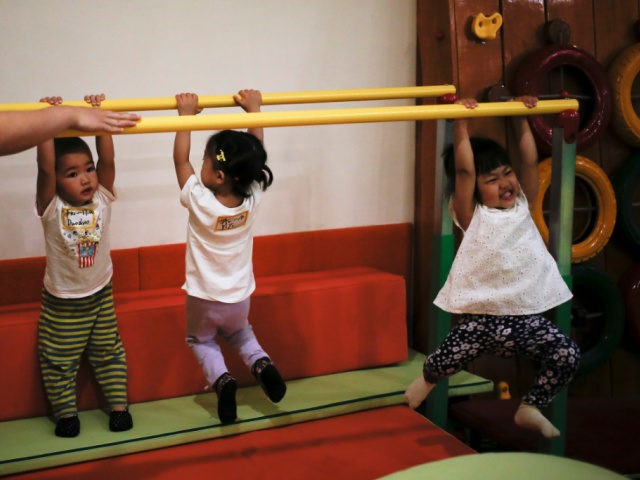The Communist Party of China announced on Monday it would allow couples to have a maximum of three children, an expansion of the recently imposed “two-child” policy and apparent response to its dismal, and worsening, national birth rates.
China published its 2020 national census this month, finding a modest increase in the population but an extremely low number of annual births. Since 1979, the Communist Party banned married couples from having more than one child, a law that resulted in mass infanticide, forced abortions, and a disproportionately high number of men in the population due to families’ preferences for baby boys.
Dictator Xi Jinping first eased the policy in 2016 to allow two children, but a lack of interest in having children on the part of young couples and a shortage of women of child-bearing age resulted in declining birth rates even after this modification. The policy applies only to ethnic Han women, the majority of the population, but China has implemented a widespread campaign of forced sterilizations of ethnic minority women, particularly Uyghurs, that undercuts its de jure looser permissions for minority families.
No evidence suggests China has ceased to forcibly sterilize minority women in response to catastrophic birth rate statistics. Beijing has, however, attempted to silence feminist voices online, fearing that calls for an equal place for women in society would also encourage women to delay starting families to focus on their careers.
The “one-child policy” resulted in the killing of 400 million children, or, in Communist Party terminology, it “averted an estimated 400 million births.”
Xi presided over a meeting of the Communist Party Politburo on Monday “to hear reports on major policy measures to actively address the ageing [sic] of population,” the state-run Xinhua News Agency reported. “The meeting reviewed a decision on improving birth policies to promote long-term balanced population growth.”
Xinhua announced in a two-sentence article that the Politburo agreed to implement a policy in which “China will support couples that wish to have a third child,” without elaborating. Women who become pregnant a fourth time would, presumably, still be forced into abortions or the killing of their children shortly after birth.
The Global Times, another state-run propaganda outlet, had repeatedly telegraphed throughout the past year that Beijing would likely soon lift its ban on families with more than two children. The publication of the national census in mid-May appeared to have cemented the move towards promoting larger families. The census reported the population of China to have increased by 12 million people between 2010 and 2020, up to 1.412 billion people. It found that China has nearly 35 million more men than women, an unnatural result of state-sponsored mass abortions and killings of baby girls.
The 2020 birth rate also caused alarm. Chinese mothers had about 12 million babies in 2020, a drop of more than two million births since 2019 and more than five million births since 2016, the year that Xi reversed the one-child policy.
“If no forceful intervention policy is introduced, China’s fertility rate may become the lowest in the world,” the Global Times warned in mid-May.
China’s birth rate is currently at about 1.3 births per mother; “replacement fertility,” or the number of children every woman in a country should have to ensure the population replenishes, is 2.1.
Demography experts have contested official Chinese Communist Party birth statistics.
“My estimates show that China’s actual population size should be 1.279 billion at the end of 2019, or 121 million fewer than the officially stated 1.4 billion,” University of Wisconsin-Madison academic Yi Fuxian said in an interview in January. “The actual number of births in China last year should be about 10 million instead of 14.65 million, as reported by the National Bureau of Statistics.”
Another expert, Liang Jianzhang, said at the time that China should expect an over 30-percent drop in the number of women of childbearing age in the next decade, which would devastate its birth rate regardless of artificial government limits on family sizes.
Driving much of the birth rate collapse is the failure of the Communist Party to provide an economic and political environment in which couples feel comfortable having children. Extreme political oppression, life-or-death threats against young children, such as poisoned formula and watered-down vaccines, and nearly no financial or career support for young couples complicate matters even for couples who do wish, theoretically, to start a family. According to the South China Morning Post, a poll taken in March found that 67 percent of millennials cited “inability to find domestic help” as the top reason they would not have a second child. Other top concerns include “financial pressure” and lack of support for women.
In addition to the falling birth rate threatening China’s economy, Beijing “is facing a significant challenge as it seeks to fill the need of hundreds of thousands of new recruits each year,” Asian News International noted this week. The People’s Liberation Army (PLA) is the world’s largest army by troop numbers but lags significantly behind the United States and other major powers technologically and in training. Last year, the PLA suffered an embarrassing defeat at the hands of the Indian military on the nation’s mutual border after PLA troops illegally established a presence in the Galwan Valley, an Indian Himalayan territory.
“Military expert Antony Wong Tong said that many mainland military officials and observers had voiced concerns about the impact of the one-child policy on the military since 1993,” ANI reported Sunday. “Professor Liu Mingfu from the PLA National Defence University in 2012 warned that at least 70 per cent of PLA soldiers were from one-child families, and the figure rose to 80 per cent among combat troops.”

COMMENTS
Please let us know if you're having issues with commenting.